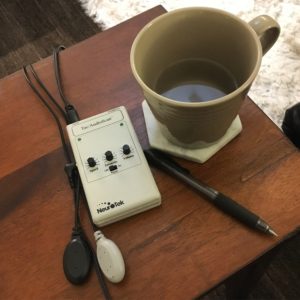EMDR for Trauma and Anxiety
What is EMDR?
EMDR (Eye Movement Desensitization and Reprocessing) is a type of therapy that engages both your brain and body in the healing process.
 When you have an experience that your brain and body perceive as threatening, you can get physically and emotionally overwhelmed, and your normal information processing system can shut down.
When you have an experience that your brain and body perceive as threatening, you can get physically and emotionally overwhelmed, and your normal information processing system can shut down.
When that happens, you can be left with extremely vivid memories of upsetting events. It can even feel as if you are still living through those events now.
You might have nightmares or find that memories pop up unexpectedly. You may feel fearful, on edge, or emotionally numb. These experiences can also make it hard to have healthy relationships.
Who does EMDR help?
EMDR is particularly useful for people who have experienced trauma, or any life experience that left a lasting negative effect.
When most people think of trauma, they think of life’s most intense and scary experiences. But relational experiences, such as having a parent who didn’t meet your needs in some way, or wanting someone to like you but being rejected, can also be stored as trauma.
Many people come to me to find relief from anxiety. Often in uncovering what is driving the anxiety, we find an upsetting past experience hidden underneath. When that is the case, EMDR can be very useful for reducing anxiety.
Why choose EMDR instead of traditional talk therapy?
Research is showing us that talking about traumatic experiences doesn’t seem to be enough to help you move past them.
 Brain scans seem to show that traumatic memories get stuck in the right side of your brain, cut off from making connections to the left side of your brain.
Brain scans seem to show that traumatic memories get stuck in the right side of your brain, cut off from making connections to the left side of your brain.
Your left brain is responsible for language, sense of time, and your ability to make meaning of your experiences.
When a traumatic experience is cut off from the left side of your brain, it is often difficult to explain the experience with words, make sense of it, and realize that it is over and in the past.
EMDR helps you activate your normal information processing system in a way that talk therapy doesn’t. When that system is activated, your memory gets unstuck and fully processed.
This process makes traumatic experiences feel less upsetting. The memory of the trauma gets appropriately filed away into your long-term memory, just like the rest of your normal memories of the past.
Let’s decide if EMDR is right for you.
If you have tried talking through your trauma with little relief, you will likely find EMDR to be more effective.
EMDR can help you heal from your past so you can live a peaceful and fulfilling life in the present.
I would love to help you through your healing process. Call me today at (805) 664-1177 for your free consultation about how I can help.
